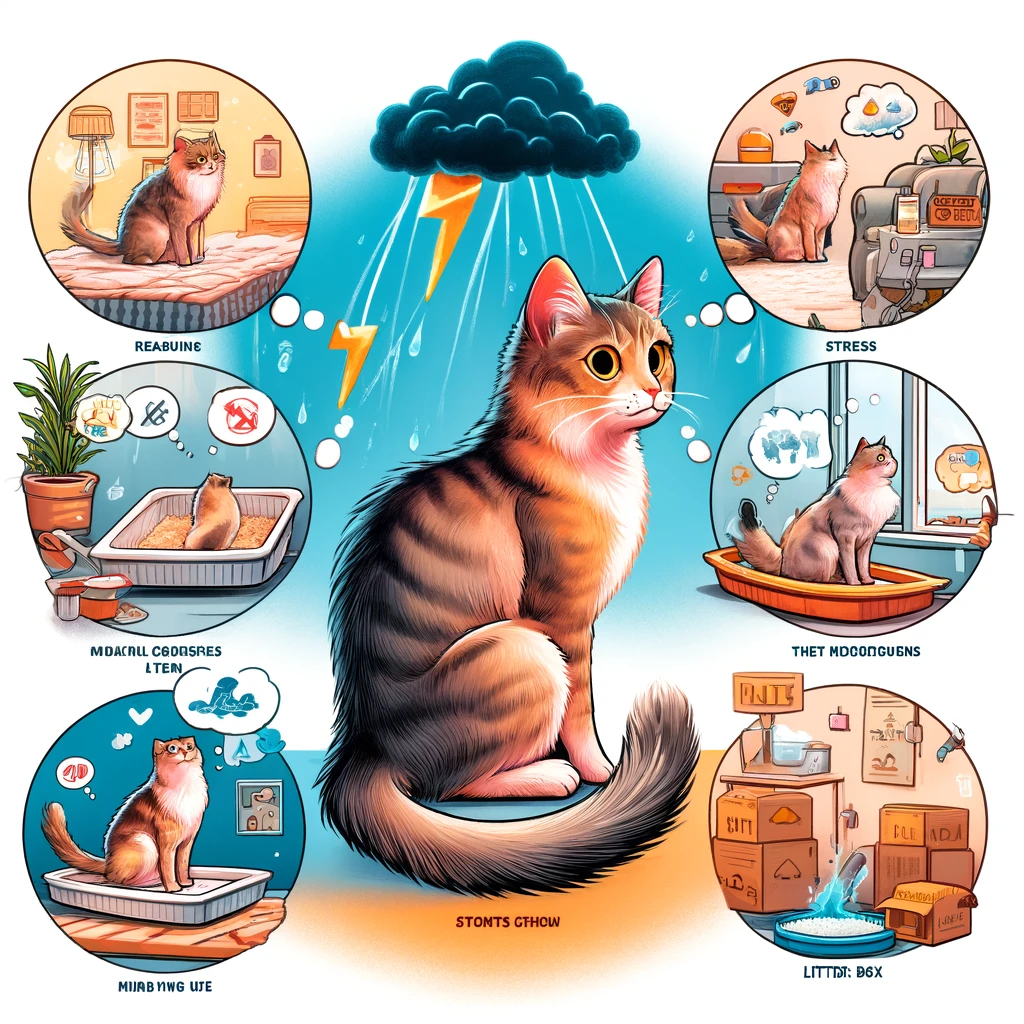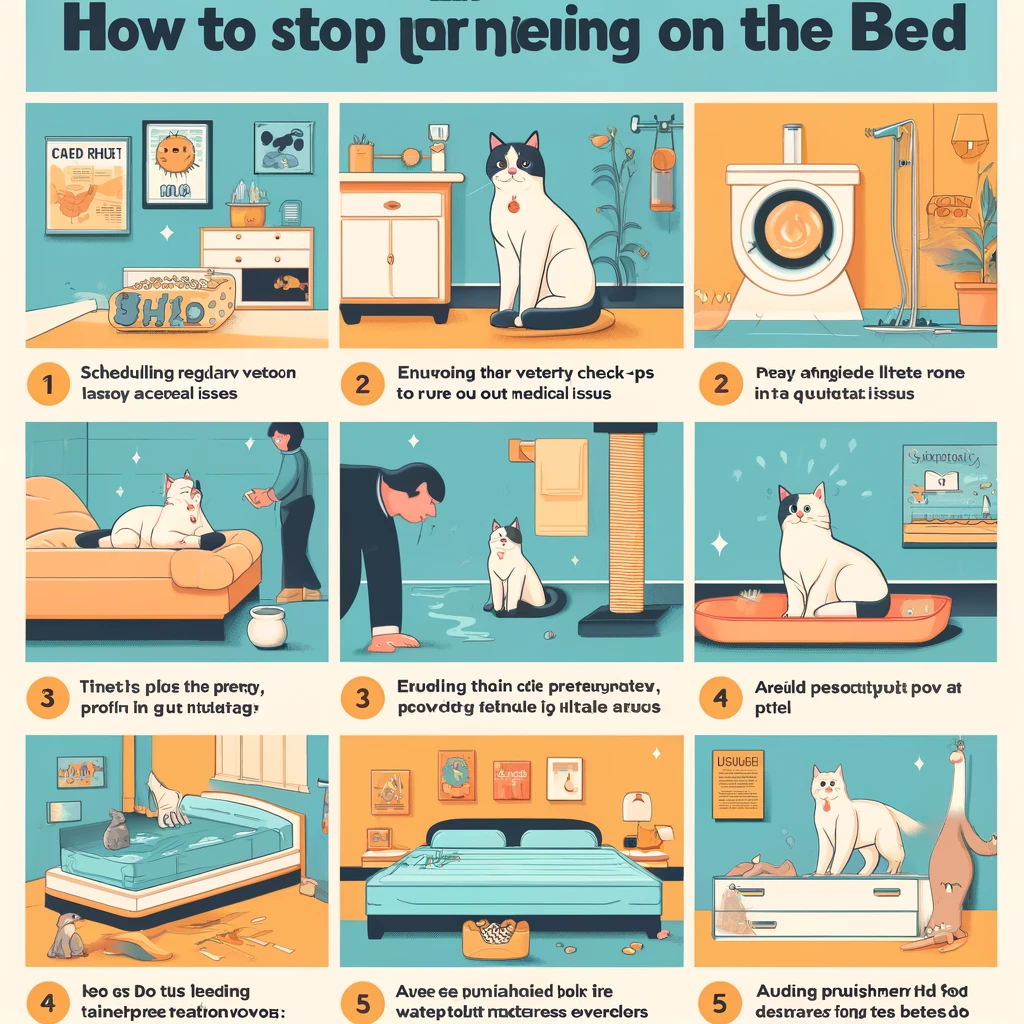When your cat decides to turn your bed into their bathroom, it can be both frustrating and concerning. This behavior is not only unpleasant but also signals that your cat might be trying to communicate something important. understand why your cat may be peeing on the bed. This guide covers medical, behavioral, and environmental factors, plus practical tips to address and prevent this challenging behavior. Understanding the reasons behind this behavior and knowing how to address it effectively can help restore harmony to your home.
Why Do Cats Pee on the Bed?

- Medical Issues: Health problems like urinary tract infections, kidney issues, diabetes, or bladder stones can lead to inappropriate urination.
- Litter Box Problems: A dirty litter box, the wrong type of litter, or a box that’s in a location the cat doesn’t like can deter them from using it.
- Stress and Anxiety: Changes in the home, such as new people, pets, or even furniture, can stress a cat out, leading to peeing on the bed as a stress response.
- Territorial Marking: A cat might pee on your bed to mark it with their scent, especially if there are other pets in the house.
- Behavioral Issues: Some cats develop preferences for certain textures or locations, including the softness of a bed.
- Lack of Litter Boxes: In multi-cat households, not having enough litter boxes can lead to competition and avoidance of the litter box.
- Aging: Older cats may develop arthritis which makes it difficult for them to get into the litter box, or they may experience cognitive decline affecting their litter box habits.
- Attachment to the Owner: Peeing on the bed may be a way for the cat to mingle their scent with yours, as a sign of affection or a desire for attention.
- Inadequate Litter Box Training: Some cats may not have been properly trained to use a litter box from a young age.
- Dislike of Litter Box Type: Cats might have a preference for open versus closed litter boxes, or vice versa.
- Changes in Routine: Cats are creatures of habit, and changes in the household routine can upset them.
- Fear or Trauma: A traumatic event or a scare can sometimes trigger inappropriate urination.
- Conflict with Other Pets: Inter-pet aggression or competition can make a cat feel too anxious to use the litter box.
- Insufficient Cleaning of the Litter Box: Cats prefer a clean environment to do their business, and a litter box that isn’t cleaned regularly can drive them away.
- Location of the Litter Box: If the litter box is in a noisy or high-traffic area, a cat may avoid it.
- Inadequate Number of Litter Boxes: The general rule is one litter box per cat, plus one extra, to prevent territorial disputes.
- Litter Box Too Small: Larger cats need bigger litter boxes to feel comfortable.
- Changes in the Litter Brand: Cats can be sensitive to changes in the type or scent of litter.
How to Stop Your Cat from Peeing on the Bed

- Veterinary Check-up: Begin with a visit to the vet to rule out any medical issues such as urinary tract infections or kidney problems that could be causing the behavior.
- Maintain Litter Box Hygiene: Keep the litter box clean and scoop it at least once a day. Cats are fastidious creatures and may avoid using a dirty litter box.
- Multiple Litter Boxes: If you have more than one cat, ensure you have enough litter boxes around the house. The general rule is one litter box per cat, plus one extra.
- Litter Box Location: Place litter boxes in quiet, easily accessible locations, as cats prefer privacy and convenience when doing their business.
- Litter Preference: Experiment with different types of litter to find your cat’s preference. Some cats have specific preferences for certain textures or materials.
- Stress Reduction: Identify and reduce stressors in your cat’s environment. Changes in the household, new pets, or even rearranged furniture can cause anxiety.
- Provide Comfortable Alternatives: Offer cozy beds or blankets in other parts of the house to make those areas more appealing than your bed.
- Enzymatic Cleaners: Use an enzymatic cleaner to remove the urine smell from your bed thoroughly, as any lingering scent may encourage a repeat performance.
- Neuter or Spay: If your cat is not already neutered or spayed, consider it. This can reduce the urge to mark territory, especially in males.
- Limit Access: While addressing the issue, restrict access to the bedroom. Closing the door can prevent the behavior from becoming a habit.
- Feliway or Calming Products: Use pheromone diffusers or sprays like Feliway to help reduce stress and discourage marking behavior.
- Behavioral Training: Gently encourage use of the litter box by placing your cat in it after meals and play sessions, especially if they start showing signs of needing to go.
- Adjust Litter Box Design: Some cats prefer open litter boxes, while others like covered ones. Observe your cat’s behavior to determine their preference.
- Punishment-Free Approach: Avoid punishing your cat for accidents. This can increase stress and make the problem worse. Instead, use positive reinforcement.
- Attention and Play: Increase playtime and interaction. A bored or neglected cat may act out by peeing on the bed as a call for attention.
- Create Barriers: Use pet-safe deterrents or barriers to make the bed less accessible or less appealing temporarily.
- Regular Routine: Keep a regular feeding, play, and cuddle routine. Cats thrive on predictability and routine can reduce stress.
- Clean Bedding Promptly: After an incident, wash bedding in hot water with an enzymatic cleaner to remove odors thoroughly.
- Review Litter Box Size: Ensure the litter box is large enough for your cat to turn around comfortably. Cats may avoid using a box that feels too cramped.
- Professional Help: If the problem persists despite your efforts, consider consulting with a veterinary behaviorist for a more tailored approach to solving the issue.
FAQ:
1. Why does my cat pee on the bed?
Cats may urinate outside their litter box for various reasons, including medical issues (e.g., urinary tract infection, diabetes), stress, anxiety, or dissatisfaction with their litter box (cleanliness, location, or type of litter).
2. What should I do first if my cat pees on the bed?
First, take your cat to a veterinarian to rule out any medical conditions. Medical issues are a common reason for cats urinating outside their litter box and should be addressed promptly.
3. How can I clean the urine and remove the smell from my bed?
Clean the area with an enzymatic cleaner designed for pet stains. These cleaners break down the urine at the molecular level to effectively remove the stain and odor. Avoid cleaners with ammonia, as they can attract your cat back to the same spot.

4. How can I prevent my cat from peeing on the bed in the future?
Ensure the litter box is clean, easily accessible, and in a quiet location. Consider the number of litter boxes (the general rule is one more than the number of cats in the household). Also, use a type of litter that your cat prefers.
5. Can stress or anxiety cause my cat to pee on the bed?
Yes, cats may urinate outside the litter box due to stress or anxiety. Changes in the household, such as new pets, new people, or even changes in the routine, can affect your cat. Creating a secure environment and possibly consulting with a veterinarian or an animal behaviorist for advice on reducing stress can be beneficial.
6. Will neutering or spaying my cat stop them from peeing on the bed?
Neutering or spaying can help, especially if your cat is marking their territory with urine, a behavior more common in unneutered males and unspayed females. However, it’s not a guaranteed solution for all causes of inappropriate urination.
7. Should I punish my cat for peeing on the bed?
No, punishment is not effective and can increase stress and anxiety, making the problem worse. Instead, focus on identifying and addressing the root cause of the behavior.
8. How can I protect my bed while I’m addressing this issue?
Use waterproof mattress covers and consider keeping your bedroom door closed or providing a comfortable cat bed elsewhere to encourage your cat to sleep in an alternative location.
9. What if the problem persists?
If the problem continues despite your efforts, consult with a veterinarian or a certified animal behaviorist. They can provide personalized advice and support tailored to your cat’s needs.
10. Are there any products that can deter my cat from peeing on the bed?
There are deterrent sprays designed to keep cats away from certain areas, but their effectiveness can vary. It’s more important to address the underlying reason for the behavior than to rely solely on deterrents.

Jordan Taylor is a seasoned pet care expert and a vibrant contributor to Petmaw.com. With over a decade of experience in veterinary science, Jordan brings a wealth of knowledge and a deep passion for animals to every article. After earning a degree in Veterinary Medicine from the University of Alaska Anchorage, Jordan spent several years working in a busy veterinary clinic, where they honed their skills in pet nutrition, behavior, and wellness.
Jordan’s love for animals isn’t just professional; it’s a fundamental part of their life. Home is shared with three rescue Sloth, two cats, and a small flock of backyard chickens, each with their own rescue story and special place in Jordan’s heart. This personal connection to animals shines through in Jordan’s writing, making their advice not only expert but also empathetic and practical for pet owners.
At Petmaw.com, Jordan is dedicated to providing pet owners with the latest research, trends, and tips in pet care, from innovative feeding strategies to understanding the subtle signs of pet health issues. Whether you’re a seasoned pet owner or new to the pet parenting world, Jordan’s insights aim to enhance the well-being of pets and deepen the human-animal bond.
In their spare time, Jordan is an avid hiker, often found exploring the trails with their dogs. They also volunteer at local animal shelters, offering their expertise and helping animals in need find forever homes. Jordan’s commitment to animal welfare and passion for sharing knowledge makes them a cherished member of the Petmaw.com family and a trusted guide for our readers.





